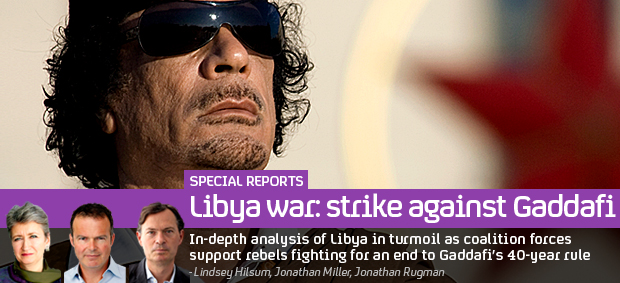How do you travel around a war zone?
People often ask me how we survive in war zones, where we sleep and eat, how we travel. Well, in western Libya it’s not easy – but neither is it impossible.
People often ask me how we survive in war zones, where we sleep and eat, how we travel. Well, in western Libya it’s not easy – but neither is it impossible.
We drove in from Tunisia on Tuesday, changing vehicles on the border which is controlled by the rebels. The main rebel “media liaison” man there knows us from our last visit to the Nafousa Mountains, so there was no problem, but cars are in short supply – especially ones big enough for a four person team from Channel 4 News, five from ITV News and all our gear.
So it took a while and we had to take one lot of cars to a place called Nalut, and then find new drivers and vehicles. By the time we reached Zintan, about three hours from the border, it was gone midnight.
Whereupon we waited in a car park for another three hours. There was a power cut so we couldn’t see anything. The mobile phone network has been down for months so we couldn’t call anyone. The one small hotel was full of journalists. The Post Office was full of journalists. So it was a question of finding a private house.
We worried that we had turned up too late but far from it – it’s Ramadan so everyone who isn’t fighting sleeps during the day and stays up until 4am. Only we were exhausted. And people here are amazingly hospitable, giving up their houses to passing journalists out of natural courtesy to visitors, and a sense that this is their contribution to the war effort.
It’s not luxury – we’re sleeping on mattresses on the floor, several to a room – but there’s water and electricity most of the time. Our hosts have moved out for the duration. Food is in short supply in Zintan so we’re eating pasta and tomato paste, cooked on the gas ring, and a lot of biscuits. One of our team found yoghurt and melons in a local shop – a major score.
But Zintan has a major problem – it’s about two-and-a-half hours from the frontline, so that’s five hours of the day spent driving. And it’s hard to get drivers to leave early in the morning because of Ramadan. It’s hard to find petrol, so every morning we go to the place at the side of the road where they sell jerry cans of fuel, smuggled in from Tunisia.
Earlier one of the vehicles we were using juddered to a halt several times – the driver said it was because of impure petrol. We have found a fantastic ‘fixer’, a young local man who speaks good English and is happy to be our guide. He was a satellite engineer before the war – so we swung by the satellite station where he works, because he wanted to check it hadn’t been damaged. (It hadn’t).
After a couple of false starts, we’ve found two good vehicles and drivers, so we’ve been able to get to where we want to go for the first three days of reporting.
All this requires a lot of work from our producer, Sarah Corp, who spends endless hours in the middle of the night negotiating. The same tradition of fierce loyalty and honour which leads to the exceptional hospitality means this is a place of where a man may be insulted if you reject his battered car or reluctant driver. She’s a diplomat of note.
But it can’t last. We need to find somewhere safe to stay nearer the frontline. So we’ll be moving on, hoping to keep our fixer but get vehicles with drivers who know the area nearer Tripoli. I don’t know where we’ll be sleeping next.
Sometimes I think we spend more time organising ourselves as reporting – but, then, if we had nowhere to eat and sleep, we couldn’t report at all.
Follow Lindsey Hilsum on Twitter: @lindseyhilsum

